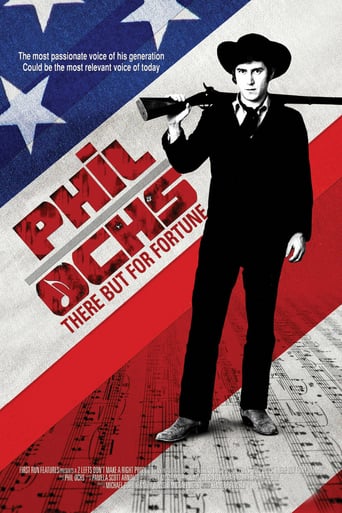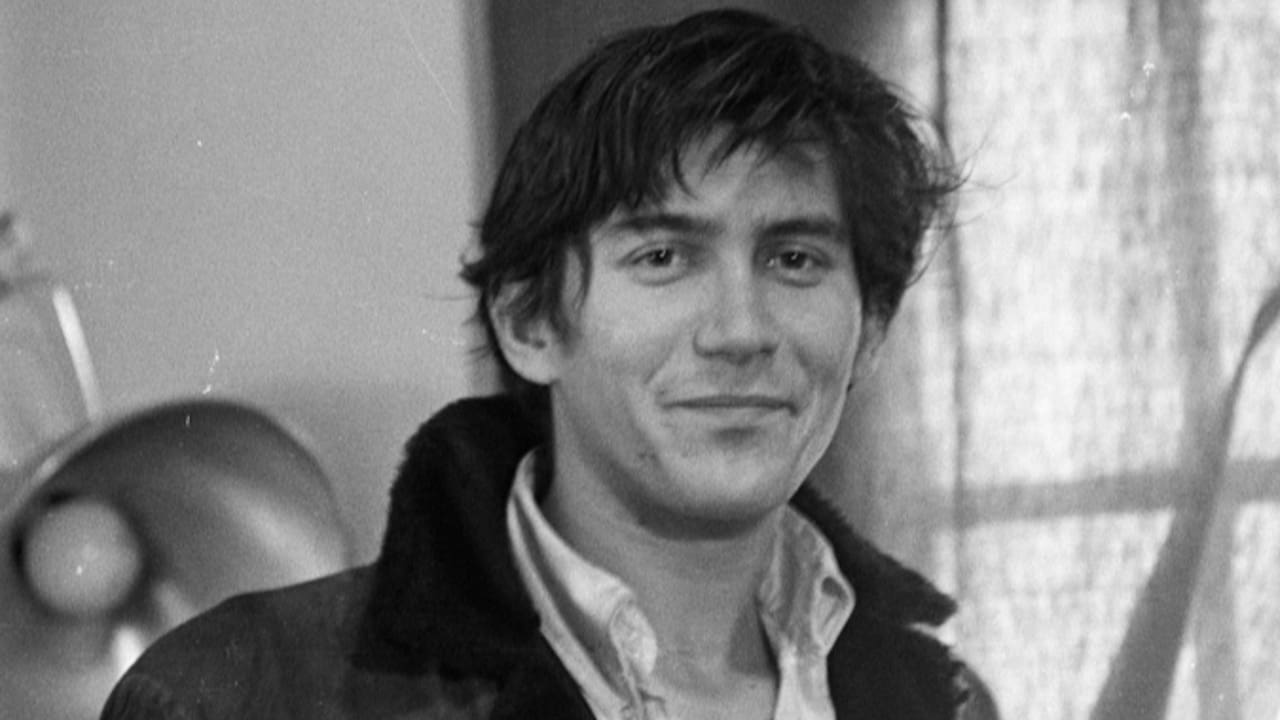Dalbert Pringle
"Liberty and Justice For All"...... Originally from El Paso, Texas - Phil Ochs (December 19, 1940 – April 9, 1976) was a protest singer and songwriter who was known for his sharp wit, sardonic humour, earnest humanism, political activism, insightful lyrics, and distinctive voice. He wrote 100s of songs in the 1960s and 1970s and released 8 albums.Ochs strongly believed that his generation would change the world. He performed at many political events during the 1960s counterculture era, including anti-Vietnam War and civil rights rallies. Ochs described himself as a "left social democrat" who became an "early revolutionary" after the protests at the 1968 Democratic National Convention in Chicago led to a police riot, which had a profound effect on his state of mind.This "There But For Fortune" documentary is definitely a worthwhile look at the man and the era in which he stood for in American history.
zee
The other reviewers seem to be reviewing Och's music or the 60's protest movement itself. I'm going to review the film, which was only so-so. I'm a great fan of documentary films, but this one was not exceptional. The inclusion of so much archival footage was interesting and the movement was fairly accurately portrayed. But as a biography, it felt incomplete to me and could have used the inclusion of opinions not just by his contemporaries, but professionals who could have offered insight into his psychiatric problems. Indeed, every time the film got close to looking at any issue in depth, it skittered away to some other topic, so I was left frustrated. In the end, I felt I'd watched just another"lite" celebrity biography like the ones I saw on A & E during the two years I owned a TV. A great biographical film leaves me with insight into not only the subject but a deeper understanding into the human heart.Examples of missed opportunities: at one point in an old interview, Ochs says he's exploring contrapunctal music. Here, you could have inserted a music theory prof pointing out in what song that manifested. Or, examine what was it like to be "just a folkie" but have aspirations to write more complex music. There really is no information about his song-writing except he liked to do it. This failing of the film extends to the personal. There's one sour, wry woman from his past who seems the only one willing to be critical of Ochs's whoring, narcissism, etc., but despite having interesting things to say, it's hard to credit her insights for she comes off as just bitter. Why not find some psychologist willing to talk about narcissistic personalities, coupled with the manic depression and alcoholism, so that we can see how Ochs deteriorated so badly? (and that was new information for me--he had severe psychotic breaks at the end of his life) Or surely some psychologist has written/researched about how, when the Vietnam War ended and Nixon had resigned, there was widespread depression among protest cats because they felt superfluous--interview that person rather than only Joan Baez who mentions it but not in a greatly illuminating way. Instead, they relied mostly on family members and close friends, who had to a large extent mythologized him, the way we all do over the years, creating narratives that match our internalized metanarratives rather than remembering accurately. For instance, they skimmed over Ochs's frequenting of whorehouses worldwide, and while it's good they included such ugly behavior and didn't try to paint him as holy and purely wonderful, the interviews with the ex-wife (still-wife? the movie doesn't tell us how or if the marriage ended) had stopped by that point in the film--gee, I'd like to have known what she felt when she figured out he was doing this (just a list of STDs he brought home would have been illuminating). I also wondered if he had been autopsied and there was brain damage from syphilis also adding to his severe mental deterioration at the end of his life. So much good info to mine, but the film skitters along the surface.Perhaps the reason for that is that they were trying to fit it into a time limit, and if so, were willing to sacrifice clarity or better art for commercial considerations...but if so, perhaps cutting out a few of the old protest march performances would have allowed for more depth.All the interviews were talking heads indoors; the film would have been more visually interesting had they varied this.The end song over the credits was a great choice. Van Ronk's performance raised goosebumps for me.Some good, some bad, but for me not a satisfying whole.
Howard Schumann
Many of us are familiar with such songs of the sixties as "I Ain't Marching Anymore," "There but for Fortune", "Love Me, I'm a Liberal," and "When I'm Gone" without remembering that the author was Phil Ochs, a singer/songwriter whose name is hardly recognized today. Kenneth Bowser, in his documentary Phil Ochs: There but for Fortune, makes sure that we find out. The film traces Ochs' rise from his beginnings as a young performer in the Greenwich Village folk scene in the early sixties to his prominence as a protest singer in the ongoing struggle against war, racism, and injustice. An artist who developed a sizable following, Ochs' self-inflicted death in 1976 at the age of 35 was a tragic signpost of the end of an era.Though the documentary breaks no new ground, its format of photos, live concert footage, and personal interviews keeps it lively and interesting, although the quick snippets we hear of Ochs' songs make it difficult to fully appreciate his talent. Interviews are conducted with Phil's brother Michael who acted as his manager, folk singers Pete Seeger, Judy Henske, and Joan Baez, actor Sean Penn, activist Tom Hayden, journalist Christopher Hitchens, and others, but not seen is Ochs' prominent contemporary, Bob Dylan. Bowser reveals that Dylan had a falling out with Ochs when Bob unsuccessfully tried to steer Phil away from what he considered to be his one-dimensional approach to song writing and urged him to express more of his personal feelings.As a consequence, Dylan, to put it mildly, is not spoken of highly in the film and his estrangement with Ochs continued until Bob joined Phil years later for a benefit concert for Victor Jara, a Chilean protest singer who was brutally murdered by Pinochet. As has been repeated often, the sixties was a time when young people truly believed that energy and idealism could change society, only to be disillusioned when powerful forces in and out of government tipped the scales in favor of political assassinations and military adventurism. As a frustrated protest movement splintered and gave way to the political theater of the Yippie culture personified by Jerry Rubin and Abbie Hoffman, and the Weather Underground began a campaign of setting off bombs on government property, Phil Ochs career began to slide.The murders of John and Bobby Kennedy, the democratically-elected Chilean Socialist Salvador Allende, and the killings at Kent State, hit him very hard as did the continuation of the senseless war in Vietnam. Ochs also continued to grapple with alcoholism and the bi-polar disease inherited from his father. His downward spiral was exacerbated when he was attacked while walking on a beach in Dar es Salaam in Africa, causing him to lose strength and range in his singing voice. Ochs' behavior took on bizarre aspects when he appeared at a concert in Carnegie Hall dressed in an Elvis Presley gold suit, shouting at his audience, "We need to turn Elvis Presley into Che Guevara." Though Ochs was not a major artist in the mold of Bob Dylan whose lyrics reverberated with poetry and breadth of vision, much of his work was important and inspiring, a singer who reflected his times and gave it new definition. He was "a young man with many reasons why" but when he was no longer young and the causes he fought for were foundering, his grip on reality started slipping and he knew that he would no longer "suffer from the pain when he was gone." When Dave van Ronk sang "He was a Friend of Mine" at Ochs' memorial concert, the words of Eminem could be heard saying, "And when I'm gone, just carry on, don't mourn. Rejoice every time you hear the sound of my voice."
orrsisland
I went originally to see this documentary because I loved Ochs music - even played some of it badly at one time - but feared it might simply be a 'trip down memory lane'. But the film is so much more than a bio of Ochs and his music or - thank god - just an exercise in nostalgia. It really captured the power and significance of the historically altering events of the 60's - both for the country and for individuals. I wish everyone - especially young people - could see it. Ochs comments in the film that Nixon used the stereotype of a drugged out-of-control protester to present the masses with the false choice of himself or 'those'. Of course that strategy of fear and false political choices is not unique to Nixon - always existed and still does. Nonetheless,it still saddens and angers me that conservatives have succeeded so well in shaping the historical lens that most people see the 60's through now. Most people today simply think of drugs, sex, rock-and-roll, and self-indulgence when they think of the 60's. Lost is any mass knowledge of what happened in Birmingham, or to martyrs like the Philadelphia Three, or the work of thousands of sincere people like Ochs who fought for fairness. The film captures this split - how the 60's was really two segments - and just as Ochs lost his way after Chicago - so did the nation. I don't have a problem with the fact that there wasn't more musical footage of Och's music in the documentary. There was enough to present his music and place in the folk scene of his time. Other sources can fill in more of his music - and hopefully people who aren't familiar with his music will do that. One documentary cannot be three films - i.e. personal bio, musical compilation, and historical analysis. It needs to have a focus and point of view. And,for me, this film captured the power and impact of his music, and how his personal life followed - sadly - the country's loss of trust and hope.


 AD
AD


